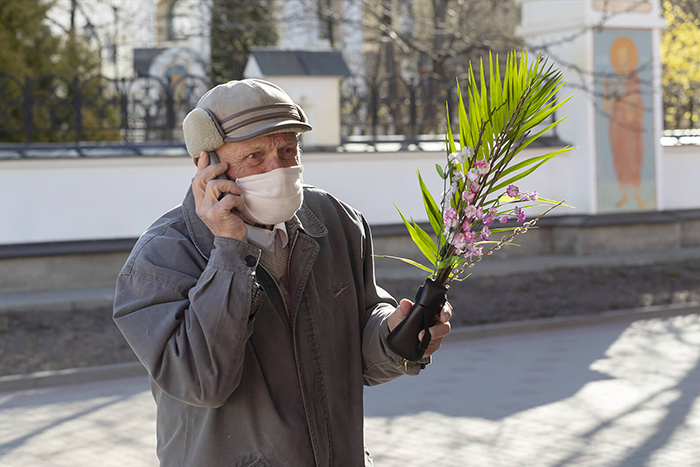
A fragment of a conversation with Archbishop Theodosius (Snigiryov) of Boyarka, suffragan bishop under Metropolitan Onuphrius of Kiev and All Ukraine.
In view of all that is happening, many people are now faced with the question: is it even possible to have the Orthodox spiritual life without a church?
Theological controversy on this topic has now intensified in the Church: is it possible or not to live without a church? I will say right away that the time may come when we will have to live without temples whether we like it or not, just like those generations of Christians who lived without temples for the first three centuries. I hope that you and I don’t live to see that day. However, it is up to us, the present-day Orthodox Christians, to think over and develop the ways of life of the Church in any conditions, even when our churches are taken away from us. After all, sooner or later this time may come.
It is possible to live and be saved without the majestic cathedrals. On the contrary, one cannot live and be saved without the grace of the Sacraments. It is in the fact that this place is where the gracious Sacraments are poured into human life that the value of the Orthodox church lies. However, Sacraments can also be performed outside church walls. A church can stand without the Sacraments being performed there — drained of blood and devoid of its purpose and meaning. Like Hagia Sophia in Istanbul. That is, it is not the temple that saves man, but the sacraments of the Church. The time may come (let us honestly and meaningfully delve into the words of the Revelation) when we won’t have our temples. What then? Will the spiritual life have to stop? Shall the sacraments cease to be performed? Of course not. It is our task to come up with ways to live in these conditions right now. We are spurred on by the world pandemic.
The other day it was reported that due to the coronavirus outbreak in Australia all Orthodox churches will be closed for six months. Half a year! It should motivate us to urgently and systemically begin to develop alternative ways of participation of the faithful in the blessed Sacraments of the Church.
Do you think that online Confession will be authorized in the Orthodox Church any time soon? There is much debate about this now.
I suppose that’s quite possible. Moreover, in the current circumstances, in which the Church finds itself during the pandemic, this mode of Confession may even become the dominant one. Nevertheless, this or other change in the way the Sacrament is performed must certainly be examined and blessed by the collective mind of the Church. It should not be the personal decision of any of the clergy or hierarchs. Generally speaking, Sacraments or rites that require personal contact or involve a physical substance as part of the Sacrament cannot be performed remotely. However, Confession is an exception in this regard. This exception has repeatedly been used in the spiritual life of Orthodox Christians of the twentieth century.
What about the Communion of the Holy Mysteries?
In the event that Christians are isolated and cannot go to church, believers have practiced communion with spare Gifts that were kept reverently in their homes since the early centuries. “Both in Alexandria and Egypt, every lay person, for the most part, keeps the Communion in his own house and partakes of it when he wants,” St. Basil the Great writes in the 4th century (Letter 93). Should our Church be forced to return to this practice with the advent of difficult times (latter-day persecutions, pandemics, or radioactive contamination), then only those believers whose loyalty is beyond doubt will be allowed to have spare Gifts at home. Every clergyman at such a time will need to have a list of members of the Church, and those who are casual visitors of the church will not be on such lists.
Also, the Liturgical Commission will certainly be instructed to elaborate the procedure for the transfer and storage of the Holy Gifts by the lay people, just as the forms of transferring the Gifts to the dying of infectious diseases in hospitals, where no priests are allowed, are currently being discussed and proposed. Dried particles of the Holy Gifts wrapped up in paper are a controversial option. From a practical point of view it is dangerous and inconvenient; any parish priest who has the experience of giving Communion to sick people at home will testify to it. It is with sadness that I recently watched a footage of the communion given on a napkin in one of the churches. This kind of liturgical arbitrariness might, of course, lead to more practical and safer ways at some point. However, it is better to think it over from scratch, taking into account the experience of the older generation of priests, than to make such experiments with the Holy Communion. If we ever end up with the practice of keeping the gifts in the homes of lay people out of necessity, or transferring the Body and Blood of Christ through lay health professionals to dying patients in infectious disease hospitals, then the particles of the Holy Gifts will most likely be reverently encapsulated by the clergy in a soluble shell (like powdered drugs). This is likely to be the most convenient form of transmission, storage, and individual communion of a layperson. With that said, we read that a priest passed the Holy Gifts to St. John the Russian in an apple…
Translated by The Catalogue of Good Deeds



